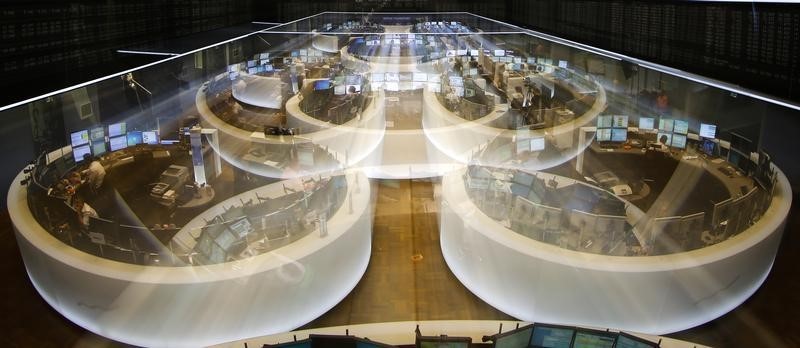By Simon Jessop and Nishant Kumar
LONDON (Reuters) - Investors looking to invest in German equities but stay clear of VW and the broader autos sector as an emissions-test cheating scandal rages will have to pay for the privilege.
For those who prefer the economy of passive funds that merely track stock indexes, no product that excludes VW in particular or German motor manufacturers in general is currently available.
The only option so far is to shift to an active fund run by managers who can buy or sell stock at any time, aiming to back winners and ditch losers. But these may charge retail clients as much as 1.5 percent of their assets a year for their services, compared with less than 0.1 percent for some funds which track blue-chip indexes.
VW faces billions of dollars in fines and law suits after it admitted cheating to make its diesel cars appear cleaner. Since the scandal erupted on Friday, its share price has dived 33 percent and its chief executive has quit, leaving investors to wonder what will happen next.
With investors fearing the scandal might spread, some may want to avoid entirely the three big German motor manufacturers, which collectively make up around 14 percent of the German blue-chip DAX index..
On top of the VW dive, BMW has lost around 15 percent and Daimler around 16 percent since Friday - despite denying they have manipulated emissions tests - helping to drag down the DAX.
This fall has hit passive investors worse than those who paid more to a fund manager to pick winning bets actively.
From the close on Sept. 17 to the close on Sept. 23, equity-focused exchange-traded funds with a focus on the DAX 30 lost around 6 percent, Lipper data showed, in line with the index.
Of the $19 billion (£12.4 billion) invested in DAX equity ETFs, the bulk, $9.4 billion, is in BlackRock's iShares DAX fund.
While most of the ETFs track the market-capitalisation weighted index of the underlying DAX, other "smart beta" products have been created to exclude certain sectors, focus on other investment factors such as a stock's cheapness or use leverage to boost returns.
The biggest winners, though, were those ETFs which bet on the index falling. Such funds, collectively managing about $871 million, were up an average 10.5 percent between Sept. 17 and Sept. 23, data from Lipper showed.
The biggest of them, db x-trackers ShortDax Daily UCITS ETF 1C, which manages $435 million but without using leverage, counted VW among its top-10 holdings and returned just over 6 percent during the period.
BALL AND CHAIN?
Any investors who fear VW's troubles could become a legal ball-and-chain dragging down its performance for years - like energy firm BP (LONDON:BP) experienced after an explosion and oil leak at its Deepwater Horizon rig in 2010 - have access to no passive product that specifically excludes VW or autos.
BlackRock, which is the world's biggest fund manager, said it had no plans yet to launch such a product, although index provider FTSE said it could create indexes that excluded VW or the autos sector, should investors demand it.
New ETFs could be sold off the back of such an index, while if the scandal festers long enough, active funds could also seek to change their mandates to track it instead of the full DAX.
At present, though, the nearest investors can get to a VW-free passive product is through a dividend-focused ETF which currently includes VW but would evict the stock if the company stopped paying. VW has set aside 6.5 billion euros (£4.7 billion) to cover the cost of recalling affected vehicles.
One such fund is BlackRock's iShares DivDAX, which includes the 15 DAX stocks with the best dividend yield.
"It is highly likely that a deteriorating fundamental outlook for VW, such as a missed dividend payment, will significantly cut VW exposure in smart beta ETFs," said Hector McNeil, co-CEO at ETF provider WisdomTree.
While index trackers are forced to hold the carmakers in proportion to their 14 percent DAX weighting, the average for all Germany-focused funds was just 11.8 percent, and many active funds did not hold any of their stock.
Of the $67 billion invested in Germany-focused active mutual funds, $41.4 billion is held in 116 equity funds, which collectively lost 4 percent between Sept. 17 and Sept. 23, Lipper data showed.

Of those, just 22 funds managing a combined $6.2 billion had VW in their top-10 holdings. They fell 5.3 percent on average during the period.